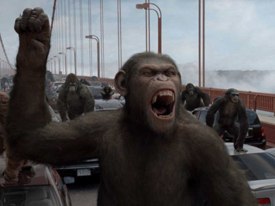This reboot of the venerable sci-fi franchise doesn't try to remake the original classic like the Tim Burton film tried. It takes a page from CONQUEST OF THE PLANET OF THE APES and starts the story with the rebellion of the apes against man, only without the time paradox element. The last part of that statement is for fans of the series, who will find great joy in this new installment. Like the original this is a film based around characters and ideas.

This reboot of the venerable sci-fi franchise doesn't try to remake the original classic like the Tim Burton film tried. It takes a page from CONQUEST OF THE PLANET OF THE APES and starts the story with the rebellion of the apes against man, only without the time paradox element. The last part of that statement is for fans of the series, who will find great joy in this new installment. Like the original this is a film based around characters and ideas.
The film is the story of two characters -- one human and one ape. Will Rodman (James Franco, 127 HOURS) is a scientist working on a gene therapy that could cure scores of brain diseases, such as Alzheimer's. It's a personal cause for him because his father Charles (John Lithgow, TV's 3RD ROCK FROM THE SUN) is suffering from senility disease. As part of his work, Will tests on chimps. After a disaster at the lab, he smuggles an infant chimp home. The young ape quickly shows signs of increased intelligence as a result of the drug his mother was given. Charles names him Caesar (Andy Serkis, KING KONG).
The stories of Will and Caesar are the central conflict, which ponders the ethics of animal testing and captivity. While I can see PETA activists cheering at the ape rebellion against oppressive humans, the film is never cut or dry about the issue. If it weren't for the experiments Caesar would be a regular chimp and humans might have died in taking the treatment. Of course the profit potential of the drug drives Will's boss Steven Jacobs (David Oyewolo, THE LAST KING OF SCOTLAND) to push for more advanced tests on the chimps. The film certainly doesn't take a bold stand on the issue like the original did on the ills of mixing religion and politics, but the ideas are there to ponder.
Driven by Serkis' powerful, Oscar-worthy, mo-cap performance, Caesar's story is compelling. His human intelligence qualities drive home the notion further that these creatures are not meant to be kept in cages. After a violent outburst, Caesar is sent to a sanctuary where he is neglected. The owner John Landon (Brian Cox, THE 25TH HOUR) is apathetic about his primates, while his son Dodge (Tom Felton, HARRY POTTER) is sadistic. Caesar uses his intelligence to communicate with a signing orangutan and gain the allegiance of a ferocious gorilla against an alpha male grey back. What Caesar wants is to give his fellow apes freedom both physically and in their minds.
Caesar's developing intelligence is captivating to watch. As a child he uses his skills to steal cookies. Will takes him to the redwood forest to explore, but uses a leash. When Caesar sees a dog on a leash, he asks whether he's just a pet too. At the sanitary, the advanced chimp strategizes the social hierarchy of the apes and his escape. As the apes make their escape, they are confronted on the Golden Gate bridge and instead of a epic battle, Caesar uses strategy to take on his enemies. This is all expressed without dialogue, making it all the more cinematic.
Will and Caesar's stories come together again in the end as the human tries to protect the simian rebel leader and his followers from fearful humans. What responsibility does Will or Jacobs have for the unforeseen consequences of the experiments? How should they react? It's curious that one of the signs of Caesar's superior intelligence is his lack of the desire to kill. He's one damn smart ape.







